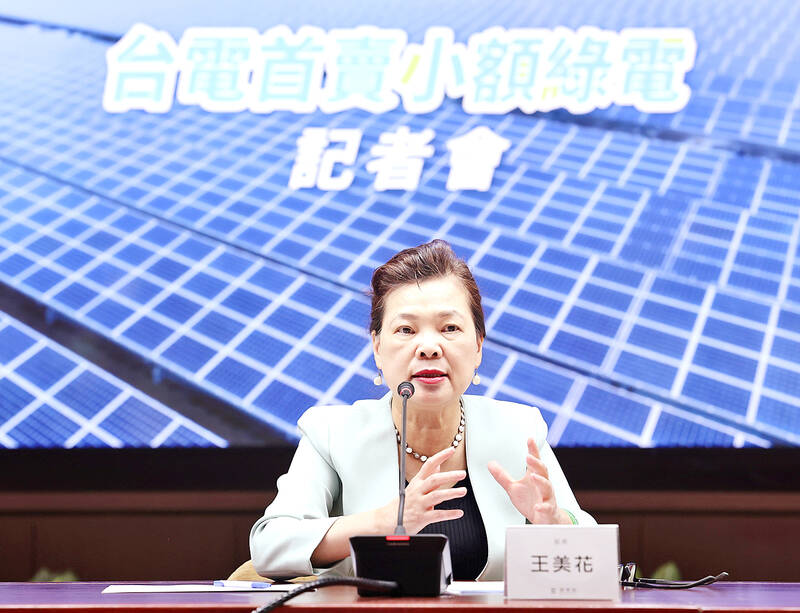State-run utility Taiwan Power Co (Taipower) is soon to begin selling small amounts of green power to small and medium-sized enterprises (SMEs) in Taiwan to help them meet the need for carbon reduction demanded by their clients, Minister of Economic Affairs Wang Mei-hua (王美花) said on Friday.
Taiwan’s exporters, many of which are part of global brands’ supply chains, are starting to feel the pressure to cut carbon emissions from clients’ intent on achieving net zero emissions by 2030, she said.
At present, big corporations are able to purchase renewable energy through corporate power purchase agreements — long-term contracts between renewable energy producers and buyers — yet SMEs have had trouble gaining access to those contracts, she said.

Photo: CNA
There has also been the issue of Taiwan simply not producing enough renewable energy to meet industrial demand, given the growing emphasis on reducing carbon emissions to address climate change.
Last year, Taiwan’s industrial sector consumed 56.1 percent of all electricity produced, but only 8.3 percent of all electricity produced was renewable, Bureau of Energy statistics showed.
To support the needs of SMEs, Taipower is to set up a renewable energy bidding platform that would offer 10 megawatt-hour and 50 megawatt-hour batches of energy from its own solar power installations for one-year, three-year or five-year periods.
The renewable energy would come from Taipower’s Salt-Field Solar Photovoltaic Power Plant in Tainan County and the solar farm in the Changhua Coastal Industrial Park, which generate roughly 300 gigawatt-hour (GWh) of power a year, or about 3 percent of all the solar power Taiwan generated last year.
The bidding platform would be managed by the National Renewable Energy Certification Center.
It is to be the first time that Taipower sells renewable energy directly to end users, the ministry said, adding that until now, it has either purchased green energy from private producers or sent green energy that it generated to the grid without specified purchasers.
The pilot program is to begin by putting up a first batch of 10 GWh for bidding at the end of this month and a second batch in the middle of next month, Taipower spokesperson Tsai Chih-meng (蔡志孟) said.
Successful bidders would be able to claim the use of renewable energy starting next year, Tsai said.
The reserve price would be set at a price that takes the feed-in-tariff (FIT) rate — a guaranteed, above-market rate that the government offered for the development of renewable energy — for the renewable energy plants and other administrative fees into account.
That would amount to an estimated NT$4 to NT$5 per kilowatt-hour, Deputy Minister of Economic Affairs Tseng Wen-sheng (曾文生) said.
Taiwan’s Electricity Act (電業法) was amended in 2017 to allow green energy producers to sell green electricity to end users by having them reserve a certain amount of power transmitted via the grid.
In 2019, the Renewable Energy Development Act (再生能源發展條例) was amended to allow renewable energy producers to freely choose between the government’s FIT policy and selling directly to private buyers, as prior to the amendment, those who had signed FIT agreements were tied to the 20-year FIT policy.

TRAGEDY: An expert said that the incident was uncommon as the chance of a ground crew member being sucked into an IDF engine was ‘minuscule’ A master sergeant yesterday morning died after she was sucked into an engine during a routine inspection of a fighter jet at an air base in Taichung, the Air Force Command Headquarters said. The officer, surnamed Hu (胡), was conducting final landing checks at Ching Chuan Kang (清泉崗) Air Base when she was pulled into the jet’s engine for unknown reasons, the air force said in a news release. She was transported to a hospital for emergency treatment, but could not be revived, it said. The air force expressed its deepest sympathies over the incident, and vowed to work with authorities as they

A tourist who was struck and injured by a train in a scenic area of New Taipei City’s Pingsi District (平溪) on Monday might be fined for trespassing on the tracks, the Railway Police Bureau said yesterday. The New Taipei City Fire Department said it received a call at 4:37pm on Monday about an incident in Shifen (十分), a tourist destination on the Pingsi Railway Line. After arriving on the scene, paramedics treated a woman in her 30s for a 3cm to 5cm laceration on her head, the department said. She was taken to a hospital in Keelung, it said. Surveillance footage from a

BITTERLY COLD: The inauguration ceremony for US president-elect Donald Trump has been moved indoors due to cold weather, with the new venue lacking capacity A delegation of cross-party lawmakers from Taiwan, led by Legislative Speaker Han Kuo-yu (韓國瑜), for the inauguration of US president-elect Donald Trump, would not be able to attend the ceremony, as it is being moved indoors due to forecasts of intense cold weather in Washington tomorrow. The inauguration ceremony for Trump and US vice president-elect JD Vance is to be held inside the Capitol Rotunda, which has a capacity of about 2,000 people. A person familiar with the issue yesterday said although the outdoor inauguration ceremony has been relocated, Taiwan’s legislative delegation has decided to head off to Washington as scheduled. The delegation

Another wave of cold air would affect Taiwan starting from Friday and could evolve into a continental cold mass, the Central Weather Administration (CWA) said yesterday. Temperatures could drop below 10°C across Taiwan on Monday and Tuesday next week, CWA forecaster Chang Chun-yao (張竣堯) said. Seasonal northeasterly winds could bring rain, he said. Meanwhile, due to the continental cold mass and radiative cooling, it would be cold in northern and northeastern Taiwan today and tomorrow, according to the CWA. From last night to this morning, temperatures could drop below 10°C in northern Taiwan, it said. A thin coat of snow